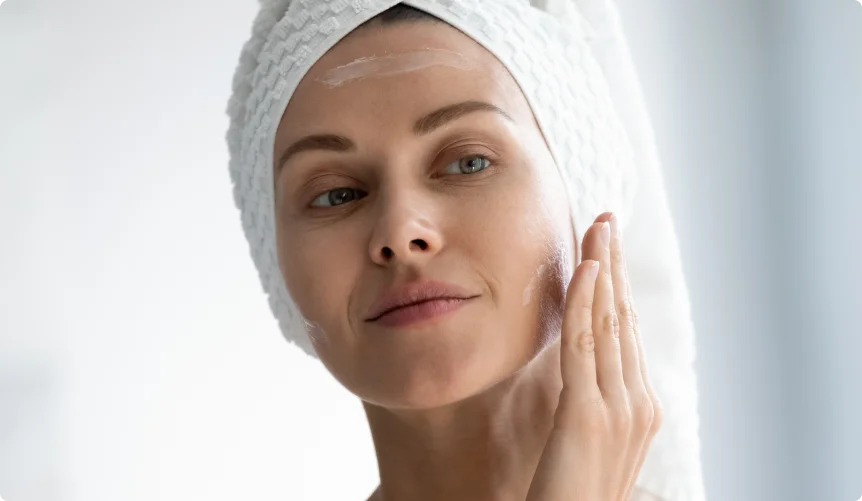
Types of Peptides and Their Benefits


Peptides are essential building blocks for proteins like collagen and elastin, which are vital for maintaining youthful, healthy skin. However, not all peptides are the same. There are several types of peptides, each with a specific role in skincare, and understanding the differences can help you choose the right peptide-based products for your needs. From boosting collagen production to reducing inflammation, each type of peptide provides distinct benefits for your skin. In this guide, we’ll explore the most common types of peptides and how they work to improve your skin’s health and appearance.

Peptides Specific
Functions

There are several types of peptides, each with its own unique benefits. Here are the main categories of peptides commonly found in skincare products:

Signal
Peptides
Signal peptides are one of the most important types of peptides in skincare because they directly communicate with skin cells. These peptides send signals to the cells to encourage the production of collagen, elastin, and other proteins that are vital for maintaining skin structure and elasticity. By promoting collagen synthesis, signal peptides can help reduce the appearance of wrinkles, fine lines, and sagging skin. They are particularly beneficial for anti-aging treatments.
Benefits:
Stimulate collagen and elastin production.
Improve skin texture and elasticity.
Reduce the appearance of wrinkles and fine lines.

Carrier
Peptides
Carrier peptides play a crucial role in transporting important minerals, such as copper, to the skin. These minerals are vital for skin health and repair. Carrier peptides help deliver these minerals to the deeper layers of the skin, where they can promote healing, stimulate collagen production, and support the skin’s natural barrier function. These peptides are often used in formulations designed to accelerate skin recovery and rejuvenation.
Benefits:
Deliver essential nutrients to skin cells.
Promote collagen production and skin regeneration.
Enhance skin repair and healing.

Enzyme-Inhibiting
Peptides
Enzyme-inhibiting peptides are designed to block the enzymes that break down collagen and elastin in the skin. As we age, the natural breakdown of collagen and elastin increases, leading to wrinkles and sagging skin. By inhibiting the enzymes responsible for this breakdown, these peptides help preserve the structural integrity of the skin. This can lead to firmer, more youthful-looking skin with improved elasticity.
Benefits:
Prevent the breakdown of collagen and elastin.
Maintain skin firmness and elasticity.
Reduce signs of aging by preserving skin structure.

Neurotransmitter-Inhibiting
Peptides
Neurotransmitter-inhibiting peptides are designed to reduce the activity of neurotransmitters that trigger muscle contractions. These peptides work similarly to botox, but they are much gentler and less invasive. By inhibiting muscle contractions, these peptides help to reduce the appearance of expression lines and wrinkles, particularly around the forehead and eyes. They are ideal for those looking to prevent or soften dynamic wrinkles without resorting to injections.
Benefits:
Reduce the appearance of expression lines and wrinkles.
Target dynamic wrinkles caused by facial muscle movement.
Offer a gentler, non-invasive alternative to botox.

Hydrating
Peptides
Hydrating peptides are designed to help the skin retain moisture and improve its overall hydration levels. These peptides enhance the skin’s ability to lock in water, keeping it plump, smooth, and nourished. By improving moisture retention, hydrating peptides help to combat dryness and dehydration, which can contribute to the appearance of fine lines and dullness. These peptides are essential for those with dry or sensitive skin.
Benefits:
Enhance moisture retention in the skin.
Keep the skin hydrated and plump.
Improve skin texture and reduce the appearance of dryness.

Anti-Inflammatory
Peptides
Anti-inflammatory peptides are particularly beneficial for sensitive skin or skin prone to redness and irritation. These peptides work by calming the skin and reducing inflammation, helping to prevent and treat conditions like rosacea, acne, and eczema. By soothing the skin and improving its resilience, anti-inflammatory peptides promote a more even complexion and overall skin health.
Benefits:
Calm irritated or inflamed skin.
Reduce redness and inflammation.
Help treat skin conditions like rosacea or acne.
How to Choose the
Right Peptides for Your Skin
Understanding your skin’s needs will help you select the most appropriate peptide-based skincare products for optimal results.
FAQ’s

Unlock the Power of Peptides

Peptides are powerful skincare ingredients that provide a wide range of benefits for your skin. From reducing signs of aging to improving hydration and soothing inflammation, peptides are a versatile tool for maintaining healthy, youthful skin. By understanding the different types of peptides and their unique functions, you can choose the right peptide-based products to address your skin concerns and enhance your skincare routine.
